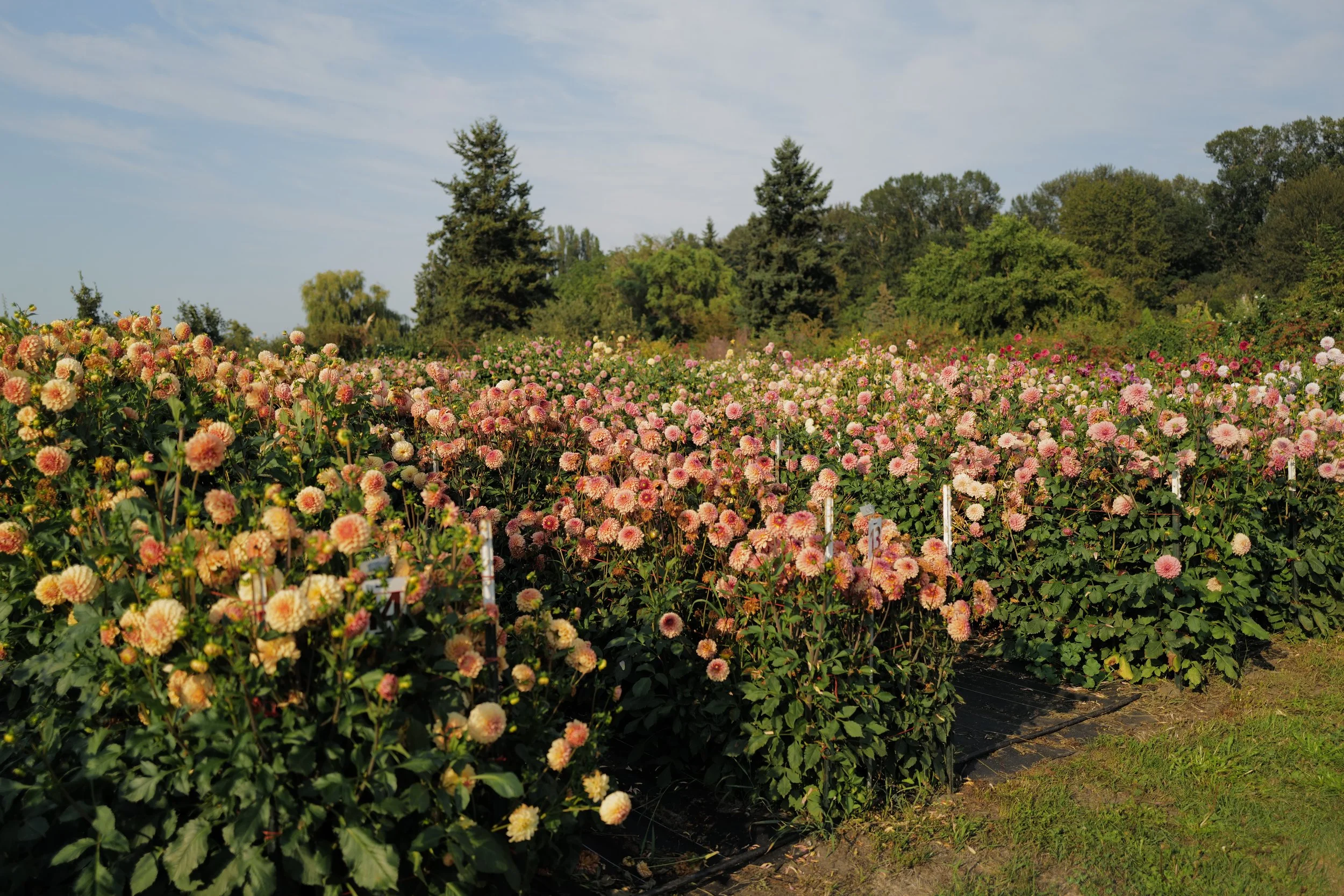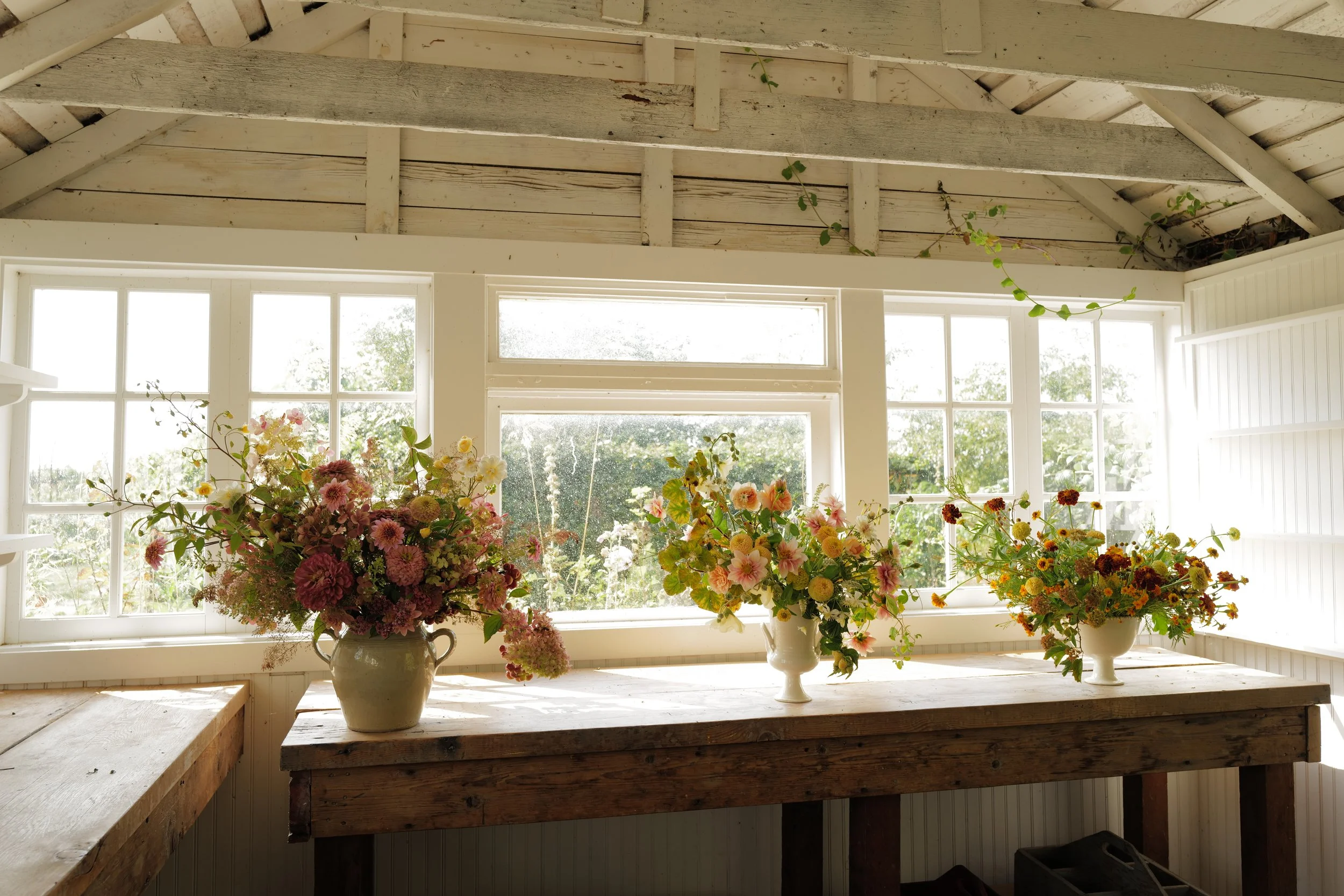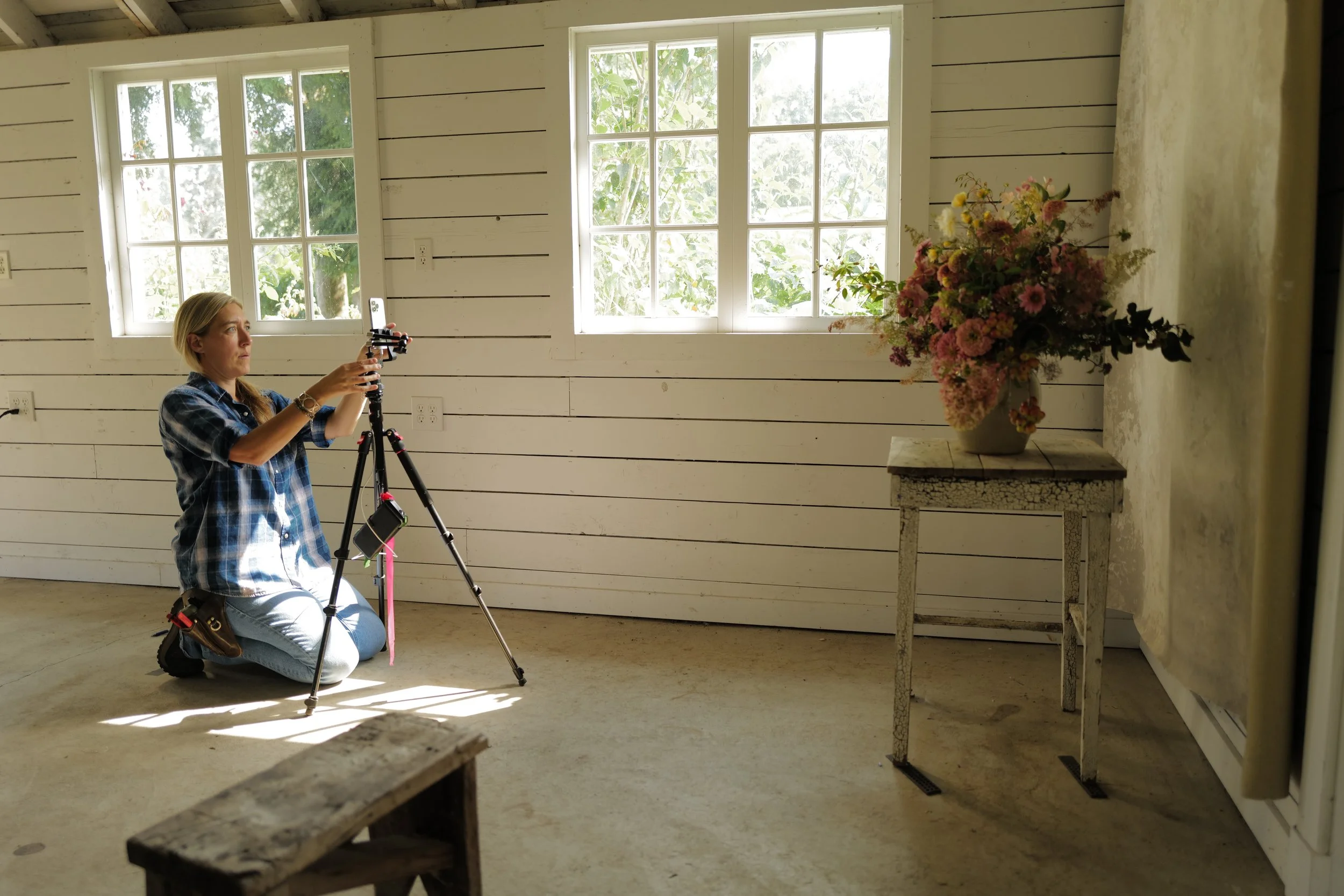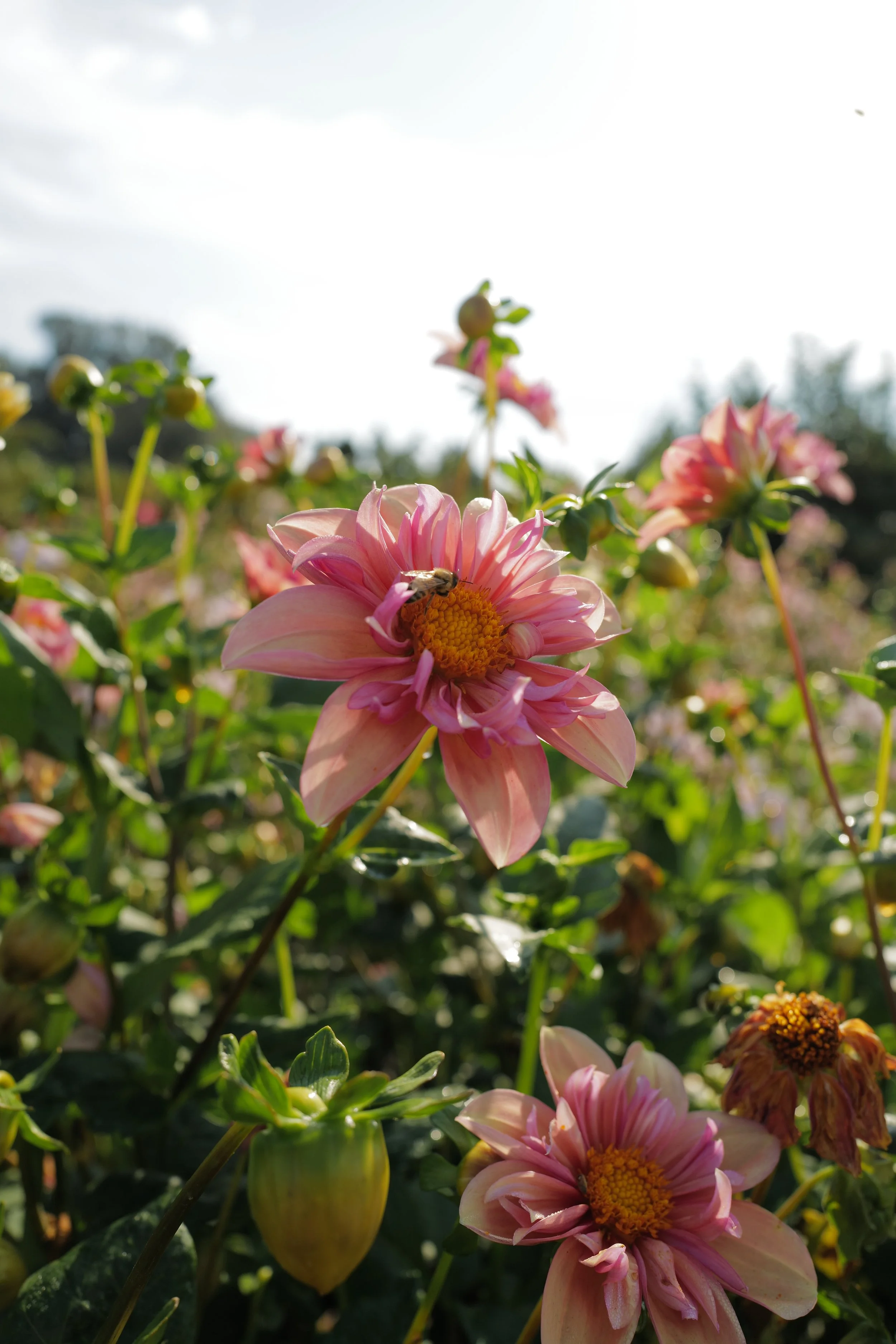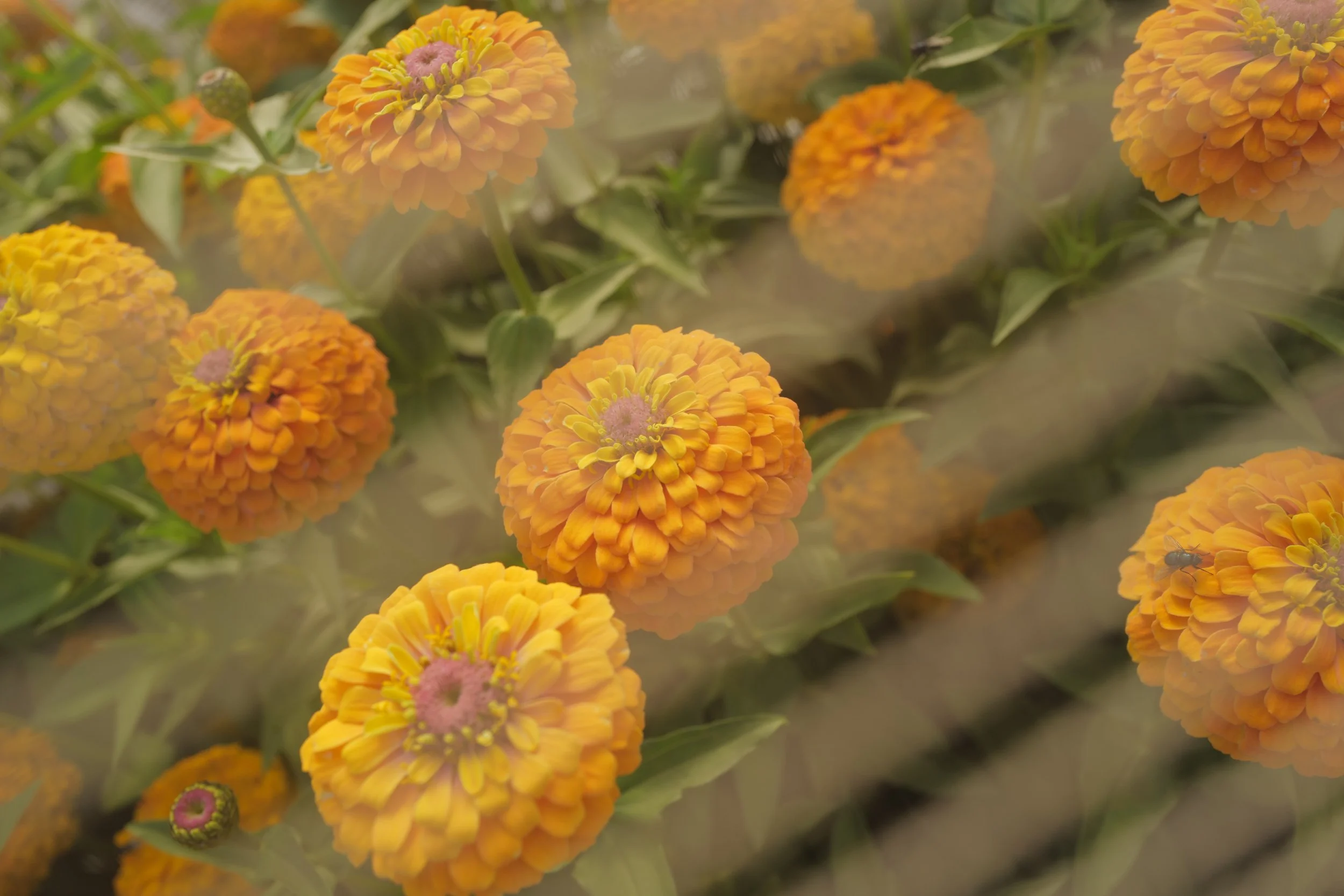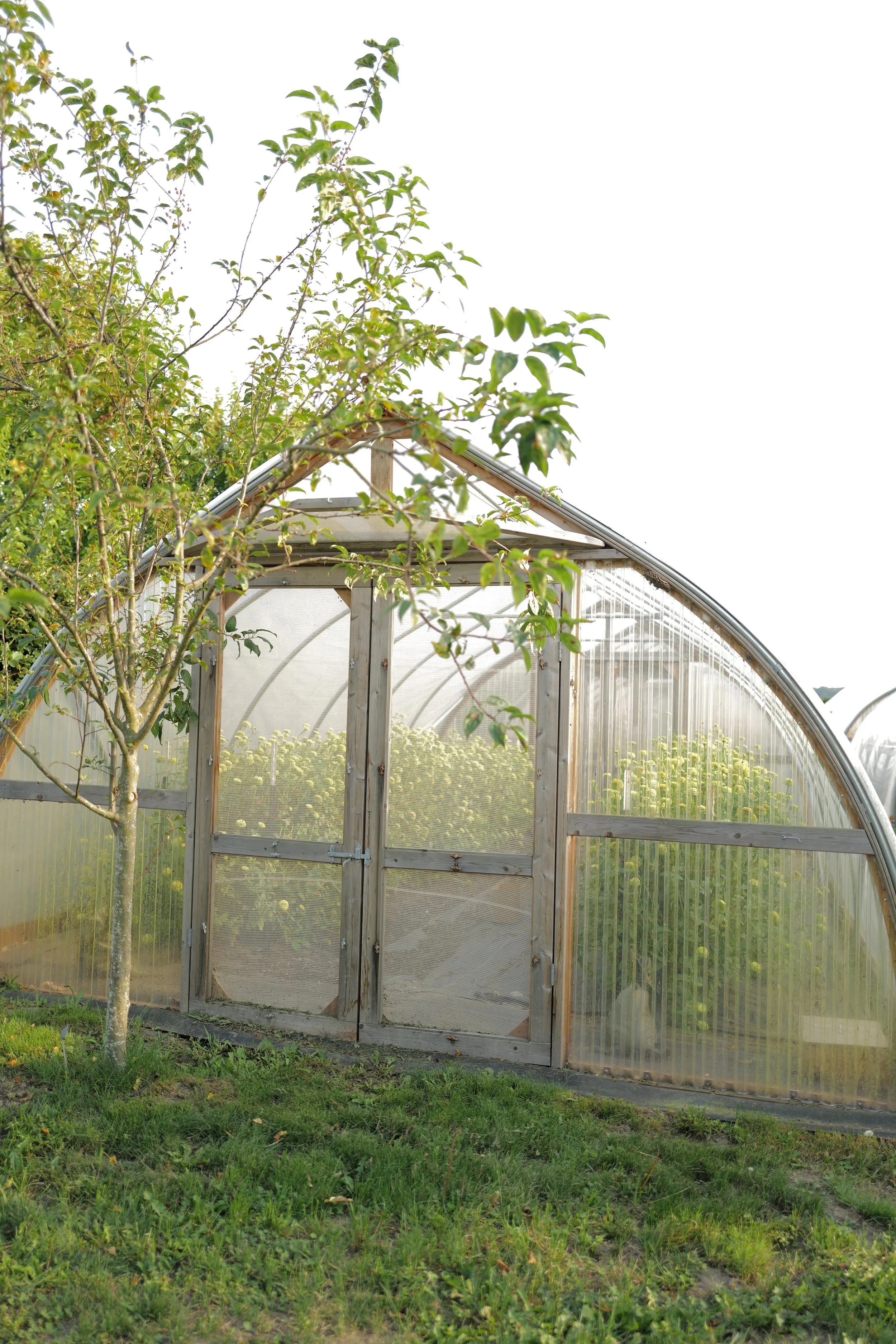On Seed Saving and Time Travel: in Conversation at Floret with Erin & Chris Benzakein
Left: Erin and Chris, Right: Nina, Milli, Erin, and Paris.
Penpals of sorts, I’ve been writing to Erin for years, long letters and small notes crossing oceans, sharing thoughts on seeds and flowers. Every now and then a golden nudge of help would come from Erin: ‘Try using a fan to winnow!’ when I put up an Instagram story about cleaning seed and using just the wind in 2020. And ‘Keep them isolated and save the seed!’, advice on a pretty cross of nicotiana that had appeared in my patch in 2019. Then last year, when Paris and I had the joyful task of helping the Floret team to get the Floret Originals into the hands of UK gardeners, we were cheered on the whole way from the Floret team. Erin has always felt like a guiding light through it all, laying down a path we’ve been lucky enough to tread.
Finally, Paris and I making it across the Atlantic to visit in person at the end of August this year, felt monumental. Driving north from Seattle into the wide, open Skagit Valley, with the mountains fading behind us and fields stretching out ahead, we kept saying to each other: I can’t believe we’re really here. It was, without exaggeration, one of the most exciting moments of our adult lives.
Over our days on the farm, we learnt so much: about seed saving, cleaning, threshing, and winnowing from Erin and Eric; and about the intricate, often invisible details of running a seed business from Chris and Nikki. We soaked up so much more from all the other team members, too. Everywhere we looked, the place seemed to hum with a kind of quiet magic. Huge skies arched over flowers of colours and shapes we’d never seen before; ducks ran across the garden beneath the trees; hydrangeas and roses tumbled in wild abundance. It felt like stepping into a secret garden, except it isn’t secret at all. Erin’s work has always been rooted in sharing: the garden, the seeds, the knowledge, the journey.
Rob Finch, the executive producer at Floret who creates the Floret Farm Journal each month (you can watch the “September 2025” episode on YouTube here), sent us a few questions to think about while we were there. One of them was the biggest and most existential question of all (I don’t think it was intended to be the existential type of question, but that is how we took it—blame it on the jet lag!): Why are you here?
seed harvests drying before being threshed.
Why are you here? That question became the seed of this conversation below. We sat down with Erin in her flower studio, out of the late August heat after two days spent on the farm, to talk about purpose, creativity, beauty, intuition, and what it means to plant for the future. A gaggle of ducks gathered at the door, their quiet patter held back by a barricade of buckets. On the table, Frances Palmer vases spilled over with crabapples and flowers I (Milli) had just been cutting in the garden (imagine the thrill and honour to cut and create at Floret!). Nina Foster of Heart Song roses and Chris Benzakein were there with Paris and I, too. It was a highlight of the trip, and we’re so happy to have you share that moment with us. Below is a transcript of our conversation (edited with just the lightest touch for clarity—mainly untangling the sentences when we were laughing and couldn’t hear the words said, or when we excitedly talked over one another). Here it is:
the ducks and the flowers in the studio
the arrangements Milli made in Erin’s studio
Erin in her studio, capturing Milli’s arrangement
---
Milli: Okay, so we’re sitting in your flower studio after spending two days on the farm, and we have a list of burning questions for you. Firstly, Rob Finch asked us to answer: Why are we here?
Erin: Why are you here?? (Erin laughs.) I wasn’t going to ask you to answer that, I promise!
Milli: Well, we can at least try and answer it for Rob! We’re here because we had to be here. If you’re invited to your mentor’s place of work, you go. Erin, you sent us a message and an email that said, “You should come,” and we said, “Yes—when?” There was no way we would say no to this opportunity! And, more broadly, we’re here to hone our seed skills, and soak up as much knowledge as possible. Someone said yesterday—after day one blew our minds and we posted about it—they left the comment, “This is the seasonal flower movement at its best: knowledge shared, passed on, strengthened.” I thought, that’s it—that’s why we’re here.
Paris: And we’ve learned over the past few years that sharing is the biggest thing, one of the best tools we have.
Milli: It also felt impossible to answer why we’re here without asking you—Why are we here with you? So that is our first question to you.
Erin: From my end, you’re here because I wanted to give you what I couldn’t find at the beginning: someone a bit further along who’d answer the real questions so you could get to the next step. Nobody would talk. Nobody would show us anything. So now, if there’s anything we have that could save you time or heartache, I want you to have it. Flower farming is already so challenging as it is.
Paris: Whenever you share something, we’re amazed you’re being so generous with your hard-won knowledge.
Milli: We are constantly amazed and inspired by that and the information you share in books, workshops, socials, resources on your website. And then, since we’ve been here with you in Washington—yesterday’s generosity of information was truly game-changing! We left the farm and both cried as soon as we left the driveway from how much we were just given by you all here.
Erin: I think we each take turns being the one who knows a little more than the person behind us. If we can turn back and share, and then when you’re ready you pass on what you’re comfortable sharing—it keeps going. Doors open. Opportunities happen. That’s how it worked for us: Doors opened after we’d knocked on so many and heard so many nos. Sometimes it’s just the answer to two specific questions or seeing one small detail in context. You don’t know which bit will change everything for someone. So: What do you need to know? What do you want to know? You know best. If we all keep passing it on, the knowledge gets better each time because we layer on top. No one’s hiding it, so it grows and gets richer instead of being kept separate and closed off.
Floret breeding dahlia
Milli: What sits underneath all of this for you, beyond flowers?
Paris: Yes, and how has it shifted?
Erin: Underneath, it’s always been about empowerment—first mine, then others—through sharing, beauty, and learning: taking something scary or hard and stripping away the “impossible” layers so someone feels, Oh, it’s not that hard; do this, this, and this. Then they try. They feel capable. That changes a lot. We saw it in workshops: It was empowerment. And always: How can we get more people to plant more flowers? It changes lives. The simplest act: growing cosmos with a child, saving a few seeds, watching pollinators—those small acts matter.
Paris: It only takes one success; then you build on it.
Erin: Exactly. You visit the garden, you water, you spend time in nature, which you might not have done if you didn’t have plants to look after. Your senses open. If kids grow up in the garden, the next generation is different. If we can get the moms growing, the next generation will be better. I want to scatter that, almost without anyone noticing it’s happening.
Milli: Same as planting a seed. It takes a while to germinate.
Erin: If people don’t have early success, many give up. We’re taught that if it doesn’t come easy, it isn’t for us. Not true! You can be “not very good,” have no obvious talent, but love it—that’s enough. It isn’t about being good; it’s about trying. I want people to succeed early, get a taste of it, hold on, and keep going. So many stop otherwise.
Milli: You should’ve seen my flower arrangements when I started.
Erin: Oh, yes. Same here. Were they “horrible”? Maybe. But they were right for where we were. I remember crying, trying to make with my hands what I saw in my head.
Milli: Same with wanting to grow a garden. I started with window boxes thirteen years ago; it was impossible to make them into my dream abundant garden.
Paris: I went heavy on bedding plants in my first garden. Bedding plants. That was my thing. Now I look back and think, maybe not the best, but it’s evolved.
Erin: You catch the bug in whatever form. Early success matters. If you can’t get the information, if no one will share, if things are made more complicated than necessary, people quit. Simplify and share so that those first wins happen. Then you’re off!
the marigold trial
Milli: After inspiring so many people and changing the course of so many lives, what legacy do you hope to leave?
Erin: I picture tiny bare feet: little ones with a hose in the garden while their mom waters and gets a minute for herself. Kids with muddy shoes, splashing in puddles, surrounded by nature. That’s it.
Milli: My son knows how to grow a sunflower already!
Erin: And he’s three!
Paris: He’s good at watering, too.
Nina: Probably really good by now!
Milli: He understands seeds and what you do to make something grow bigger. I love that. He’ll probably know more about growing before he can tie his shoelaces.
Erin: Exactly! That connection to the natural world stays intact instead of being severed. We’ve drifted far from it. Maybe we can’t change it in this generation, but the next? Yes! Think beyond ourselves: What can we pass forward? You pull a book from the library shelf, crack it open, and think, I need to do something else with my life! Or you grow a plant and the course of your life changes. If you can leave those little portals for the next person, do it!
Milli: Timely follow-up: How has working with plants and seasons shaped your sense of time? In brackets I’ve written, really a question about time travel.
Erin: (Erin laughs.) I’m impatient by nature. Breeding has changed me the most. You can’t make it go faster; it takes as many years as it takes. Five or six years with one plant just to see if something’s possible. I used to feel rushed and demanding: This needs to happen now! That can work elsewhere, but not with nature. Push too hard and it dies. Rush and you miss the journey. I used to hate hearing “It’s about the journey,” but I’m starting to like the journey.
Nina: You get so many beautiful destinations along the way with all the growing.
Erin: Exactly. And you don’t even know where you’re going. Get on the ride. You can have a sense, but you can’t plan all the magic. You can’t even know what’s in store.
Breeding dahlias, and zinnia breeding tunnel
Breeding zinnias
Milli: Do you feel the tension between growth and rest?
Erin: I do. (Erin laughs.) You know I do!
Milli: Can you still listen to your seasonal rhythms? You said yesterday that May is quieter…
Erin: Seed growing has a different rhythm than flower farming. There’s a quietness to it at times of year that would be busy for a flower farmer. The challenge is when your love becomes a business. Layers build: selling and shipping seeds, writing a book, other projects—and the year fills up. When you’re just growing, winters are for dreaming and sleeping. That piece has slipped away, and finding it again is hard.
Paris: We struggle with that.
Milli: When we find the work is so fun.
Paris: We don’t want to say no. We keep adding more.
Milli: It’s hard to step away because it’s beautiful all the time.
Paris: And if we remove something, we immediately want to fill the gap—
Milli: —With something else that intrigues us.
Erin: Over time, you do a few things you thought you wanted, but you didn’t really want, and you get worn out. You learn: Every big thing takes your whole heart, so you have to choose wisely. We go big; we go deep. I don’t mean to—it just gets complex fast. It’s not complicated, just complex. I open the door and the fairies come in. I’m yelling, “Slow down!” but I don’t want to shut the door on beauty. Sometimes it’s a once-in-a-lifetime thing; I want to witness it. Then I think: What’s next? I don’t know. We’re just… going.
Milli: You can’t shut the door on beauty.
Erin: You can’t.
Milli: I haven’t mastered rest, or balance.
Paris: And not feeling guilty when you rest. I struggle with that: I should be doing this…
Milli: Life’s never boring.
Erin: Never. People ask for a typical day: there isn’t one. It’s always different, always full. I wish I were bored!
Milli: I love the richness of this work. The only way I miss boredom is watching my son learn what creativity comes from boredom, and what boredom can make.
Erin: Totally.
Milli: Flowers are often dismissed as decorative, but the work you do elevates them to be emotional, even transformational. They speak to people. What do you think people are really looking for when they seek flowers?
Erin: At first, it’s beauty. That leads them back to nature; nature leads them back to themselves. They’re trying to fill a void, but really with themselves. Flowers are the vehicle; it isn’t even about them. People become more of who they’re meant to be, they fill up with themselves.
Milli: What did you call it earlier, the ether…?
Nina: The ether realms.
Milli: So much of your work blends science, intuition, beauty. How do you make space for intuition in a world that demands strategy and structure?
Erin: It comes easily if I listen to myself first. Too much input, too many opinions, make it hard to hear. We don’t make big decisions on the spot or by committee. The path is set privately first; brainstorming doesn’t create it. It’s a solo thing that takes shape, and then I share. I usually keep early ideas secret—literally label a document “secret” and hide it—because those ideas feel tender, not hardened off. Even agreement is a gust of air; disagreement can blow it over! Protect it until it’s stronger and you know what it wants to be. It tells you, given time.
Milli: That’s helpful. We have strong intuition.
Paris: And then someone’s input can throw us and I second-guess myself.
Erin: Don’t tell anyone for months, maybe years. People will say, “Great idea, but call it this,” or “What if you did that?” Those small comments loop in your head. You forget what you wanted. Once the idea strengthens, you’ll know again. To me, ideas feel like low clouds heavy with rain—you feel them, but you need quiet and space. Then a tail drops and you can pull it... but not if people are around and you’re talking. Be available and the muse will find you. It’s sacred. You never ask it, “What do you think?”
Paris: We often have the same thought and start saying it at the same time. That’s when we know we’re onto something.
Erin: Sometimes you can pull it, sometimes not. Our seed book sat in the ether for three years—so frustrating! I kept asking, “Do you want me to do this?” Some things drop fast; others take ages. Elizabeth Gilbert’s Big Magic says ideas find a new host if you’re not available. It sounds creepy, but I think it’s true: If you’re not ready or open, the idea might go to someone else.
learning some alternative seed saving techniques with Eric on the Floret fields
one of the isolation tunnels in the breeding programme
Milli: What’s a belief, or an approach, you’ve completely changed your mind about?
Chris: Hmm…
Erin: (Erin turns to Chris.) What do you think?
Chris: I was going to say that Erin doesn’t change her mind. She changes the way to get there.
Erin: Here’s one: I used to think if people knew how right and good it is to grow locally and organically, they’d be convinced. I carried a flaming torch: This is better for the environment! But that pushy, righteous approach doesn’t work. Be the Pied Piper.
Milli: Sing a beautiful song.
Erin: Exactly, and people follow. Don’t make people feel bad or alienated. Be accepting and inclusive; there’s room for everyone, all ways of thinking. That’s why I won’t say, “I’ll never use peat,” or draw hard lines in public. You’ll drive people away from a beautiful thing. Sometimes all they can get is one bag of something. Budgets, access—a thousand reasons. I was more of a purist at the start, with opinions on how things should be. Over time, I learned: It doesn’t matter. Just try. It doesn’t have to be perfect or “right.” There’s no single right and wrong—just get your hands in.
Paris: Same with seeds—people get nervous. You’ve just got to try.
Erin: Even a cheap packet from the garden centre.
Paris: Or cress. Grow something and succeed at growing.
Erin: Exactly. It’s the act of doing, not doing it “right.”
Breeding zinnia, and Alcalthaea suffrutescens
Milli: In building a global community of growers, seed-savers, and breeders, what’s surprised you most about what connects people through flowers?
Erin: The love of it. Finding someone else who is as obsessed as you are. Often, people are the only one in their circle who feel that way. That’s why the community is tight-knit. You find your people and hold on.
Nina: It all feels like a huge surprise, thinking back to the beginning.
(The ducks outside the studio start quacking at the door.)
Erin: Oh, yes. It all took a long, long time.
Nina: Things we joked might happen have been far surpassed. It isn’t surprising that people flock to it—everyone wants to feel something. There are so many who never imagined they’d “play in the dirt,” then they do and realise, Oh, this is what a person is meant to do. I’ve done it my whole life. I’m always happy when someone says, “I got some seeds-–I’m going to try!”
Erin: When we started, the industry was different: flower shops owned by men, wholesale houses run by men, auctions run by men. Closed doors. Secrets. It’s still male-dominated at the big scale, but the influx of women changed the culture: community-building, openness, sharing, pulling people up rather than pushing them down. It’s more abundant now. Look at the people breeding flowers and teaching breeding: it’s mostly women. The openness is why progress has been so fast. Yes, local competition can be challenging, but overall the industry is night and day different from when I started 20 years ago.
Milli: Seeds make it tangible: Someone saved them, passed them on, and here they are in our hands. That’s a thread you can feel.
Erin: Exactly.
Milli: And think of the people who first teased them out, food and medicine alongside beauty. You don’t mess with what works for food and medicine, so they must have shared knowledge to keep it safe. Community is baked in.
Paris: It feels special to be on that thread.
Erin: When you’re at the beginning and there’s so little information, the few things you do know feel urgent to share. You trade hard-won insights. Eventually, the next generation won’t remember the scarcity. That’s the goal: share and document so no one can gatekeep it again. Once it’s out in the world, it can’t be trapped. That’s ultimate empowerment.
the hydrangeas in full flower
Milli: Final big one: What role can flower growing play in today’s environmental and cultural conversation?
Erin: Beauty matters beyond aesthetics; it feeds people, and the impact is measurable. Desire for beauty draws people into gardens. Lawns become habitats. Pollinators return. Children run. Small nurseries and seed companies appear. It also has to be economically viable or it won’t last. Meet people with delight—colour palettes, roses, whatever door gets them in—and the deeper shifts follow. Honestly, planting cosmos might do more good than changing to an LED light bulb, because it gets you outside, moving, paying attention. It’s indirect and direct at once.
Paris: A meandering path that still gets where it’s going.
Milli: I think it’s more direct than it looks.
Erin: From higher up, you can see the line. Down low, it’s messy.
Milli: Thank you.
Paris: Wonderful answers.
Erin: Great questions.
Milli: We’ve asked so many while we’ve been here—
Paris: —and had so many amazing answers.
Milli: Every question has been met with enthusiasm and detail. We’re so grateful.
Erin: We know you appreciate detail!
Milli: What’s amazing is walking through the farm. Each area is a different project; in the buildings, so much is happening. Each facet is different and full of detail—
Paris: —and full of passion. Everything is cared for in the same way. Nothing gets forgotten; it all moves forward.
Erin: It’s a complicated thing to manage, and it’s taken a toll, balancing all the pieces. They’re connected; you want separation for balance, but each part impacts the others. It’s complex, woven. We’re still figuring it out. Each thing feels like the most important: preserving plants, making new ones…
Milli: Past, present, and future, always.
Erin: Exactly. Step from one garden to the next and you’re in the past… then the future.
Nina: For sure.
Erin: Sometimes I think, Are we qualified to do this? But we’re doing it.
Paris: Doing the work qualifies you.
Milli: I think about “being qualified” all the time. Feeling qualified isn’t useful; being qualified isn’t necessary. But having a load of passion and enthusiasm is helpful.
Nina: Yeah, stamina to keep going outside and doing it.
Erin: So many people with pieces of paper have come here and said, “This is my retirement dream.” I ask, “Why not do it now?” You’re more qualified than us to do it. The world isn’t fully set up for it yet, but it’s coming.
Milli: I feel like you time-travel all the time and you know things we don’t.
Erin: I’m telling you, get ready!! I’m so glad you came.
Milli: Thank you for having us.
Paris: We’ll never forget our time here. Thank you.
Left: Paris & Milli (BEAMING) Right: The buckets from the field to work into arrangements in Erin’s studio
Left: Paris, Erin, and Chris. Right: Eric
Left: Milli & Rosario Right: Nina, Milli & Paris

